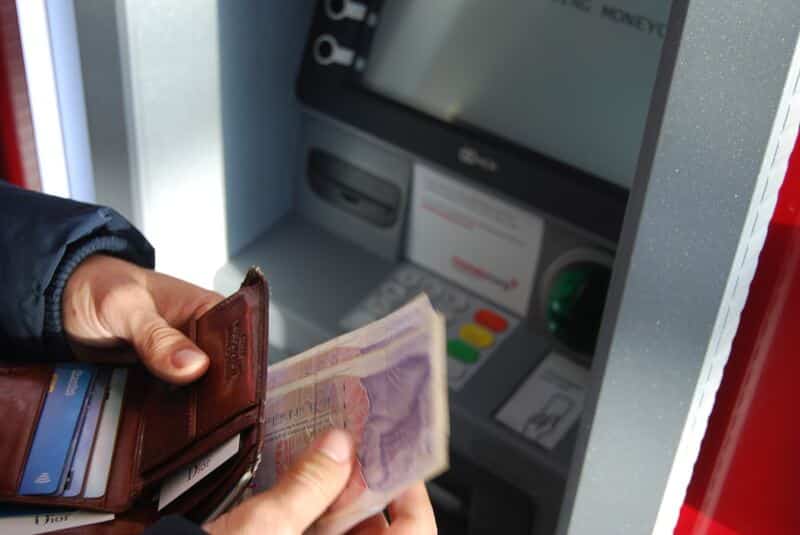As an expat, finding the best banks in Bali to handle your finances is crucial. With so many options to choose from, it can be overwhelming to decide which bank is the right fit for your specific needs.
This blog aims to provide you with a comprehensive guide on the best banks in Bali for expats. The goal is to help you make an informed decision about which bank to choose, based on factors such as fees, customer service, accessibility, and more.
So whether you’re a new expat in Bali or you’re looking to switch banks, read on to discover the top banks in Bali that cater to expats.
If you are looking to invest as an expat or high-net-worth individual, which is what I specialize in, you can email me (advice@adamfayed.com) or WhatsApp (+44-7393-450-837).
What are the requirements for opening a bank account as an expat in Bali?
To open a bank account in Bali as an expat, there are several requirements that you will need to fulfill.
These requirements may vary slightly depending on the bank you choose, but in general, you will need:
- A valid passport: You will need to show a valid passport as proof of identification.
- A KITAS or KITAP: A KITAS (Temporary Stay Permit Card) or KITAP (Permanent Stay Permit Card) is required for non-Indonesian citizens to open a bank account. If you do not have a KITAS or KITAP, you may need to provide additional documentation to prove your residency in Bali.
- A minimum initial deposit: Most banks in Bali require a minimum initial deposit to open a bank account. This amount may vary depending on the bank, but it is typically around IDR 1 million.
- A reference letter: Some banks may require a reference letter from a reputable person or organization to vouch for your character and financial stability.
- A Tax ID Number (NPWP): In some cases, you may need to provide a Tax ID Number (NPWP) to open a bank account in Bali.
Are there any specific types of bank accounts that are recommended for expats in Bali?
Yes, there are specific types of bank accounts that are recommended for expats in Bali depending on their financial needs.
Here are some of the common types of bank accounts that expats in Bali can consider:
Savings account
This is a basic account that allows you to deposit and withdraw money, and earn interest on your balance. A savings account can be a good option if you’re looking to save money for future expenses.
Checking account
This account allows you to deposit and withdraw money and write checks. It’s a good option if you need to make frequent transactions and payments.
Foreign currency account
If you’re receiving income in a foreign currency, you may want to consider opening a foreign currency account. This type of account allows you to hold and transact in foreign currency, which can help you avoid exchange rate fluctuations and fees.
Fixed deposit account
A fixed deposit account is a type of savings account that pays a higher interest rate but requires you to keep your money in the account for a fixed period of time. This can be a good option if you’re looking for a low-risk investment with a guaranteed return.
Investment account
Some banks in Bali offer investment accounts that allow you to invest in stocks, bonds, and other securities. This can be a good option if you’re looking to grow your wealth over the long-term.
What are the best banks in Bali for expats?
Choosing banks in Bali as an expat depends on your specific needs and preferences. These five banks in Bali are known for their reliability, convenience, and excellent customer service, making them a good starting point for expats looking to open a bank account in Bali.
Citibank
Citibank is a global bank that offers a wide range of banking services for expats in Bali. It has a strong reputation for providing excellent customer service and convenient online banking services. Citibank offers a range of bank accounts, credit cards, and investment options, as well as foreign currency accounts. Citibank also has a network of ATMs in Bali, which makes it easy to access your money.
Bank Danamon
Bank Danamon is one of the largest banks in Indonesia and offers a variety of banking services for expats in Bali. It has a strong reputation for providing quality customer service and has a large network of branches and ATMs throughout Bali. Bank Danamon offers a range of bank accounts, credit cards, and investment options. It also has a mobile banking app that makes it easy to manage your account on the go.
Bank Mandiri
Bank Mandiri is one of the oldest and largest banks in Indonesia, with a strong reputation for providing reliable banking services. It offers a variety of bank accounts, credit cards, and investment options for expats in Bali. Bank Mandiri has a large network of branches and ATMs in Bali, which makes it easy to access your money. It also offers online banking services and a mobile app for easy account management.
HSBC
HSBC is a global bank that offers a range of banking services for expats in Bali. It has a strong reputation for providing high-quality customer service and convenient online banking services. HSBC offers a variety of bank accounts, credit cards, and investment options, as well as foreign currency accounts. It also has a network of ATMs in Bali, which makes it easy to access your money.
Bank Negara Indonesia (BNI)
Bank Negara Indonesia is a state-owned bank that offers a variety of banking services for expats in Bali. It has a strong reputation for providing reliable and trustworthy banking services. BNI offers a range of bank accounts, credit cards, and investment options. It also has a large network of branches and ATMs in Bali, which makes it easy to access your money.

Citibank is considered to be one of the best banks in Bali for expats. Photo by Miquel Parera on Unsplash
Which banks in Bali offer the best foreign currency exchange rates for expats?
When it comes to foreign currency exchange rates, the rates offered by banks in Bali can vary significantly. However, here are a few banks that are known for offering competitive exchange rates for expats in Bali:
Citibank
Citibank is a global bank that offers foreign currency accounts in a variety of currencies. They offer competitive exchange rates for currencies such as USD, EUR, AUD, and GBP. They also have a wide network of ATMs in Bali, making it easy to access your funds in a foreign currency.
Bank Danamon
Bank Danamon offers foreign currency accounts in several currencies, including USD, EUR, AUD, and SGD. They offer competitive exchange rates for these currencies and have a wide network of branches and ATMs in Bali.
Bank Mandiri
Bank Mandiri offers foreign currency accounts in a variety of currencies, including USD, EUR, AUD, and SGD. They offer competitive exchange rates for these currencies and have a large network of branches and ATMs in Bali.
HSBC
HSBC is a global bank that offers foreign currency accounts in a range of currencies, including USD, EUR, AUD, and GBP. They offer competitive exchange rates for these currencies and have a network of ATMs in Bali for easy access to your funds.
Can expats in Bali easily access online banking services from their home country?
Yes, expats in Bali can generally access online banking services from their home country as long as they have an internet connection. Many banks in Bali offer online banking services that allow you to manage your account, transfer funds, pay bills, and more, all from the comfort of your own home.
To access online banking services as an expat in Bali, you may need to go through a few steps to set up your account and verify your identity. This can typically be done by providing your account number and other identifying information, such as your passport or KITAS/KITAP.
Once your account is set up and verified, you can typically access your account online using your bank’s website or mobile banking app. Some banks may require additional security measures, such as two-factor authentication, to ensure the safety of your account.
It’s important to note that accessing online banking services from your home country may be subject to certain restrictions, such as time zone differences or internet connectivity issues. Additionally, some banking services may not be available online or may require additional verification measures for security reasons.
What fees and charges should expats expect to pay when opening and maintaining a bank account in Bali?
When opening and maintaining a bank account in Bali as an expat, there are several fees and charges that you may encounter. Here are some of the common fees and charges that you should be aware of:
Account opening fee
Some banks in Bali may charge an account opening fee when you first open your account. This fee can vary depending on the bank, but it is typically between IDR 50,000 to IDR 100,000.
Monthly maintenance fee
Some banks in Bali may charge a monthly maintenance fee for keeping your account open. This fee can vary depending on the bank and the type of account you have, but it is typically between IDR 10,000 to IDR 25,000 per month.
ATM withdrawal fee
If you withdraw cash from an ATM that is not owned by your bank, you may be charged a fee. This fee can vary depending on the bank and the ATM, but it is typically between IDR 7,500 to IDR 15,000 per withdrawal.
Transfer fee
If you transfer money to another bank or to an account in a different country, you may be charged a transfer fee. This fee can vary depending on the bank and the amount of money you are transferring, but it is typically between IDR 20,000 to IDR 100,000 per transfer.
Foreign exchange fee
If you make a transaction in a foreign currency, you may be charged a foreign exchange fee. This fee can vary depending on the bank and the currency, but it is typically between 1% to 3% of the transaction amount.
It’s important to note that the fees and charges associated with opening and maintaining an account in banks in Bali can vary depending on the bank and the type of account you have. It’s always a good idea to review the fee schedule of your specific bank to understand the costs associated with your account.

Banks in Bali offer various type of accounts for locals and expats. Photo by Nick Pampoukidis on Unsplash
Are there any limitations on the amount of money that can be transferred in or out of Bali for expats?
Yes, there are limitations on the amount of money that can be transferred in or out of Bali for expats. These limitations are set by the Indonesian government and are intended to prevent money laundering and illegal activities.
According to Bank Indonesia regulations, individuals are allowed to transfer up to USD 10,000 or its equivalent in other currencies out of Indonesia without prior approval. For amounts over USD 10,000, individuals are required to provide documentation, such as a tax ID number, to support the transaction.
In addition, banks in Bali may have their own limits on the amount of money that can be transferred in or out of the country. These limits can vary depending on the bank and the type of account you have.
It’s important to note that the limitations on transferring money in or out of Bali can change over time, so it’s a good idea to check with your specific bank and the Indonesian government regulations to ensure that you are complying with current requirements.
What is the process for transferring money internationally from a Bali bank account?
The process for transferring money internationally from a Bali bank account can vary depending on the bank you use, but here is a general overview of the steps involved:
- Verify your account: To transfer money internationally from your Bali bank account, you will need to verify your account with your bank. This may involve providing documentation such as your passport, KITAS/KITAP, and Tax ID number.
- Provide recipient details: You will need to provide the recipient’s details, including their name, address, and bank account information, as well as the amount you wish to transfer and the currency.
- Confirm the transfer details: Before completing the transfer, you will need to confirm the details of the transaction, including the exchange rate, transfer fees, and any other applicable charges.
- Initiate the transfer: Once you have confirmed the details of the transfer, you can initiate the transaction through your bank’s online banking platform, mobile app, or by visiting a branch in person.
- Track the transfer: After initiating the transfer, you can track the progress of the transaction through your bank’s online banking platform or by contacting their customer service department.
How secure are banks in Bali for expats’ financial transactions?
Banks in Bali take security measures to protect the financial transactions of expats and other customers. Here are some of the security measures that Bali banks typically have in place:
- Data encryption: Bali banks typically use data encryption to protect sensitive information such as passwords, account numbers, and personal information.
- Two-factor authentication: Many Bali banks require two-factor authentication for certain transactions, which means that customers must provide two forms of identification (such as a password and a security code sent to their mobile device) to verify their identity.
- Fraud monitoring: Bali banks have fraud monitoring systems in place to detect and prevent unauthorized transactions and suspicious activity on customers’ accounts.
- Secure online banking: Bali banks offer secure online banking platforms and mobile apps that use encryption and other security features to protect customers’ financial transactions.
- Physical security: Bali banks typically have physical security measures in place at their branches and ATMs, such as security cameras and security guards, to prevent theft and fraud.
While Bali banks take security seriously, it’s important for expats to take their own precautions as well. This includes using strong passwords, keeping personal information secure, and monitoring their accounts regularly for unauthorized transactions. Expats can also contact their bank if they suspect any fraudulent activity on their accounts.
Are there any local customs or etiquette that expats should be aware of when dealing with banks in Bali?
Yes, there are some local customs and etiquette that expats should be aware of when dealing with banks in Bali. Here are a few things to keep in mind:
- Dress appropriately: When visiting a bank in Bali, it’s important to dress appropriately and avoid wearing revealing or inappropriate clothing. This is especially important when visiting more traditional banks or branches located in religious areas.
- Greetings: In Bali, it’s common to greet people with a smile and a handshake, and to use formal titles such as “Bapak” (for men) and “Ibu” (for women) when addressing someone of seniority or respect.
- Respect for authority: Balinese culture places a strong emphasis on respect for authority and hierarchy. When dealing with bank employees or officials, it’s important to show respect and avoid confrontational behavior.
- Patience: Balinese culture values patience and taking time to build relationships. When dealing with banks in Bali, it’s important to be patient and not expect everything to happen quickly or efficiently.
- Local language: While many bank employees in Bali speak English, it’s always appreciated when expats make an effort to speak some of the local language. Learning a few basic phrases in Indonesian can help build rapport and show respect for the local culture.

Dress appropriately when dealing with banks in Bali. Photo by Clay Banks on Unsplash
Conclusion
In conclusion, Bali is a popular destination for expats and there are several banks in the region that cater to their unique financial needs.
With a range of services and competitive rates, expats can easily access their funds, transfer money internationally, and manage their accounts online or in-person.
Expats in Bali have a variety of options when it comes to choosing a bank.
By doing their research, being aware of local customs and etiquette, and taking the necessary precautions to protect their financial transactions, expats can make the most of their banking experience in Bali.
Pained by financial indecision? Want to invest with Adam?

Adam is an internationally recognised author on financial matters with over 830million answer views on Quora, a widely sold book on Amazon, and a contributor on Forbes.



